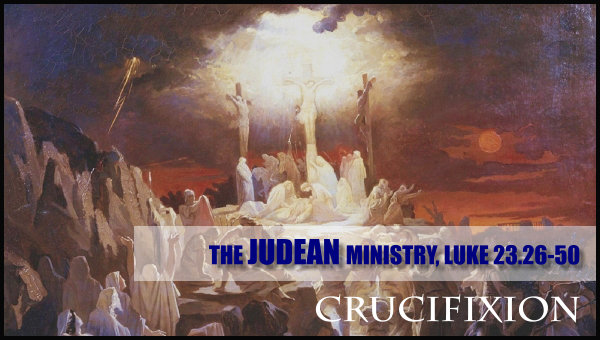By Tyson Thorne

The Judean Ministry at Various Cities (18.1-24.53), 23.26-50
Luke leaves out many of the more brutal details that Matthew and Mark include and picks up the story with Simon of Cyrene taking the cross from Jesus to carry it the rest of the way to Golgotha (23.26). Jesus and two other criminals were led by the guards and followed by Simon and a group of women who wailed in mourning. Jesus addressed the latter group explaining their tears would be better expressed for those who would experience the coming judgment. What judgment is Jesus referring to? Probably not the one you’re thinking of.
Jesus is probably not referring to the final judgment before the Great White Throne since this would not happen in the lifetime of the women Jesus was speaking to. It is likely the Jewish revolt and Roman response that results in the destruction of Jerusalem in 70 AD. While the Romans and historians alike attribute the demolition of the city to a Jewish revolt against Rome, Jesus makes clear on several occasions that it is a judgment against the nation. While Jews mourned the destruction of the temple, it was no longer necessary since Jesus became our final sacrifice. To this day there have been no sacrifices for sin in that great city.
The procession was taken to a hill just outside Jerusalem that protruded from a mountainside and looked like a skull, hence the popular name it was given, but it was also called Golgotha in Aramaic and Calveria in Latin (from which we derive the word “Calvary” in English). Luke explains in a rather matter if fact manner that Jesus and the two other criminals were hung on crosses and the Roman soldiers gambled for Jesus’ clothes. Jesus prayed for the forgiveness of his executioners, though some scholars argue this verse was added later. There remains credible evidence, however, that the prayer is authentic, including the fact that it fits with Luke’s other themes. After this prayer, the religious authorities began to mock Jesus, something the Roman’s joined in on, all of them decrying that if Jesus was something special he should be able to save himself.
Jesus did not save himself, however. He had a mission to fulfill and this was the final moment. Some have argued that if God is all powerful then why doesn’t he intervene and save us from life’s hardships? This passage is important when addressing such concerns. If God did not spare Jesus from such brutal treatment, we should have no expectation of being spared ourselves. This is not to say that God is incapable, only that it is not part of his mandate. God desires the eternal salvation of our souls, not comfortable lives. Jesus has told us already, many times, that we would also suffer for knowing him (something the disciples knew all too well). There will be a time when the suffering ends and we enter eternal rest, but that time is not now.
The soldiers nailed a sign to the Jesus’ cross, identifying him as “The King of the Jews”. They thought they were patriots defending Rome, not murderers of the Son of God. Perhaps this is why Jesus forgave them. One of the criminals began to throw his own insults along the lines of the others. “Aren’t you the Messiah?” he asked. “Then save yourself, and us!” he demanded. But the other criminal defended Jesus saying,
“Don’t you fear God? You and I are under the same condemnation – and rightly so! We are getting what we deserve for our crimes, but this man did nothing wrong.” Turning to Jesus he asked, “Jesus, remember me when you come in your kingdom.”
The second criminal had faith in Jesus, and that faith saved him. Jesus told him as much, “Today you will be with me in Paradise.” This exchange took place about noon, and Jesus would die three hours later, his last utterance being a prayer, “Father, into your hands I commit my spirit.” Something happened during those three hours. In the silence of the day, only the labored breathing of the crucified could be heard. We know from the other Gospels that a supernatural cloud cover formed over the hill. The atmosphere had changed dramatically, convincing one of the guards of Jesus’ innocence. The people mourned. Up until that moment they were hoping for a different outcome. They left beating their chests in sorrow not understanding that this singular action resulted in the possible salvation of humanity. The followers of Jesus, including the women Jesus addressed on the road to Calvary, witnessed these events.
|
|